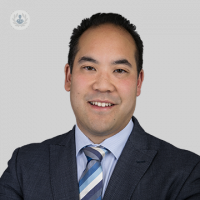An overview of irritable bowel syndrome
Written in association with:Irritable bowel syndrome (IBS) is a condition which can result in discomfort, shame and embarrassment, negatively impacting the simple aspects of everyday life. Dr Derek Chan, revered consultant gastroenterologist provides an overview of the condition.

What are the symptoms of irritable bowel syndrome IBS?
The symptoms of IBS can vary from person to person and may come and go over time. Some common symptoms include:
- Abdominal pain or cramping, often relieved by passing stool.
- Bloating or gas.
- Diarrhoea or constipation, or alternating between the two.
- Urgent need to have a bowel movement.
What causes IBS?
The exact cause of IBS is unknown, but it is thought to be a result of a combination of factors, including:
Motility issues: The muscles in the intestines may contract abnormally, leading to constipation or diarrhoea.
Gut-brain interaction: There may be increased communication between the brain and the gut, making the gut more sensitive to stress and other triggers.
Microbiome imbalance: Changes in the gut microbiome, the community of bacteria that live in the intestines, may play a role.
How is IBS diagnosed?
There is no specific test for IBS, therefore diagnosis is based on a medical history, physical examination, and ruling out other potential causes of gastrointestinal (GI) symptoms. Doctors may use tests such as stool tests, blood tests, and imaging tests to rule out other conditions.
Are there any treatments available for IBS?
Unfortunately there is no cure for IBS, but there are treatments that can help manage symptoms and improve quality of life. Treatment options may include:
Dietary changes: Identifying and avoiding trigger foods, such as fatty or greasy foods, spicy foods, caffeine, and alcohol, can help manage symptoms.
Lifestyle modifications: Managing stress, getting regular exercise, and getting enough sleep can also improve symptoms.
Medications: Over-the-counter medications, such as antispasmodics and laxatives, can help to relieve specific symptoms of IBS. Prescription medications, such as antidepressants and antispasmodics can also work to alleviate symptoms.
Psychological therapies: Therapies such as cognitive-behavioural therapy (CBT) can help manage stress and improve coping skills.
What foods should I avoid if I have IBS?
There isn't a universal solution to this question, as trigger foods differ from individual to individual. Nonetheless, certain foods commonly serve as triggers, such as:
Fatty or greasy foods: These foods can slow down digestion and worsen constipation.
Spicy foods: These foods can irritate the lining of the intestines and worsen diarrhoea.
Caffeine: Caffeine can stimulate bowel contractions and worsen diarrhoea.
Alcohol: Alcohol can also irritate the intestines and worsen symptoms.
It is important to keep a food diary to identify your personal trigger foods. Once you know your triggers, you can avoid them or limit your intake to manage your symptoms.
If you would like to book a consultation with Dr Chan, do not hesitate to do so by visiting his Top Doctors profile today.


